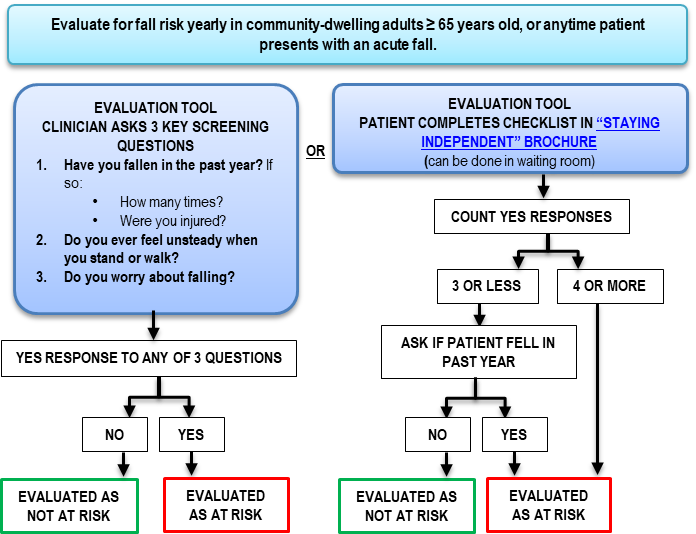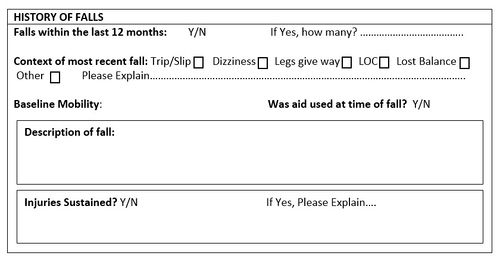What Does Dementia Fall Risk Do?
What Does Dementia Fall Risk Do?
Blog Article
The Basic Principles Of Dementia Fall Risk
Table of ContentsGetting The Dementia Fall Risk To WorkNot known Details About Dementia Fall Risk All About Dementia Fall RiskGetting My Dementia Fall Risk To WorkAn Unbiased View of Dementia Fall Risk
Guarantee that there is a designated area in your clinical charting system where staff can document/reference ratings and record relevant notes related to fall avoidance. The Johns Hopkins Autumn Threat Analysis Tool is one of many devices your staff can make use of to aid stop negative clinical events.Individual falls in healthcare facilities are typical and debilitating damaging events that persist despite years of effort to minimize them. Improving communication throughout the evaluating registered nurse, treatment team, client, and client's most entailed family and friends may strengthen fall prevention efforts. A team at Brigham and Female's Hospital in Boston, Massachusetts, looked for to establish a standardized fall prevention program that focused around boosted communication and patient and household involvement.

The development team highlighted that effective execution depends on client and staff buy-in, combination of the program right into existing workflows, and fidelity to program procedures. The team noted that they are coming to grips with how to guarantee connection in program application throughout periods of situation. Throughout the COVID-19 pandemic, as an example, an increase in inpatient drops was connected with restrictions in person involvement together with constraints on visitation.
Dementia Fall Risk Things To Know Before You Buy
These events are typically considered avoidable. To execute the intervention, companies need the following: Accessibility to Fall suggestions sources Fall suggestions training and re-training for nursing and non-nursing team, consisting of brand-new nurses Nursing process that allow for individual and family members involvement to conduct the drops assessment, guarantee usage of the prevention strategy, and perform patient-level audits.
The outcomes can be highly damaging, often increasing individual decline and triggering longer hospital keeps. One research approximated stays raised an added 12 in-patient days after a client autumn. The Loss TIPS Program is based upon appealing people and their family/loved ones across three major processes: analysis, individualized preventative treatments, and bookkeeping to make sure that patients are participated in the three-step fall prevention process.
The individual evaluation is based on the Morse Loss Range, which is a confirmed loss threat evaluation tool for in-patient health center setups. The scale includes the 6 most usual reasons patients in medical facilities drop: the patient loss background, high-risk problems (consisting of polypharmacy), usage of IVs and other exterior devices, mental condition, gait, and wheelchair.
Each risk aspect web links with several workable evidence-based interventions. The registered nurse produces a strategy that incorporates the treatments and shows up to the care group, person, and household on a laminated poster or printed visual help. Registered nurses establish the strategy while meeting the client and the individual's family members.
Dementia Fall Risk for Beginners
The poster works as a communication tool with other participants of the individual's treatment group. Dementia Fall Risk. The audit part of the program consists of analyzing the patient's knowledge of their danger aspects and prevention plan at the unit and hospital degrees. Nurse champs conduct at the very least 5 individual interviews a month with clients and their family members to look for understanding of the loss avoidance strategy

An approximated 30% of these falls lead to injuries, which can vary in seriousness. Unlike various other adverse events that require a standardized scientific response, autumn avoidance depends highly on the needs of the person. Consisting of the input of people that know the patient finest enables better personalization. This method has shown to be more reliable than autumn prevention programs that are based primarily on the production of a risk score and/or are not adjustable.
What Does Dementia Fall Risk Mean?

Based on bookkeeping outcomes, one site had 86% compliance and two websites had over 95% compliance. A cost-benefit analysis of the Loss pointers next program in 8 healthcare facilities estimated that the program price $0.88 per person to execute and resulted in savings of $8,500 per 1000 patient-days in straight prices associated with the avoidance of 567 drops over three years and 8 months.
According to the advancement team, companies curious about executing the program needs to conduct a readiness assessment and drops prevention spaces analysis. 8 Furthermore, companies ought to make certain the necessary infrastructure and process for implementation and create an execution plan. If one exists, the company's Autumn Prevention Task Pressure should be entailed in planning.
Fascination About Dementia Fall Risk
To begin, organizations ought to make certain conclusion of training components by registered nurses and nursing aides - Dementia Fall Risk. Health center staff need to evaluate, based on the requirements of a health center, whether to make use of a digital wellness document printout or paper variation of the fall avoidance plan. Applying groups should hire and train nurse champions and develop processes for auditing and coverage on loss data
Staff require to be associated with the procedure of revamping the operations to engage individuals and family members in the evaluation and prevention plan procedure. Solution should remain in location so that devices can recognize why a loss occurred and remediate the reason. A lot more particularly, nurses ought to have networks to give continuous responses to both staff and device leadership so they can change and boost autumn prevention workflows and interact systemic troubles.
Report this page